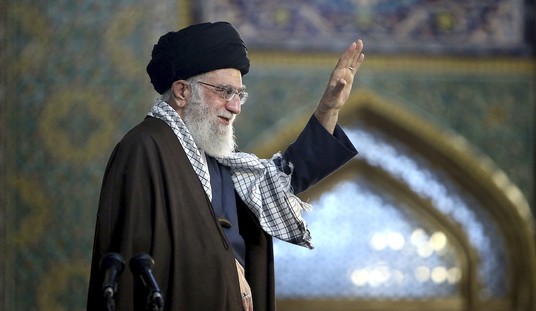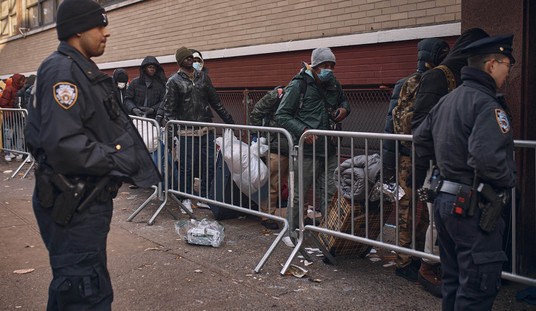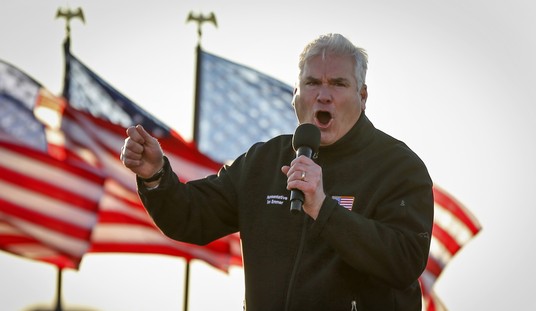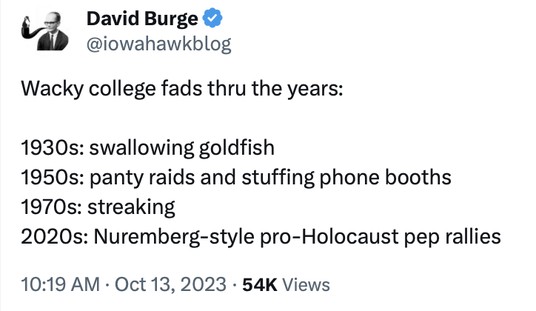Oh my. What, we wondered, did Michael Flynn have that led Robert Mueller to let him off with a relatively minor plea deal to one count of lying to investigators? According to ABC’s Brian Ross, it’s that Donald Trump ordered Michael Flynn to make contact with the Russians as a candidate — but for what purpose? And is that illegal? [See update below]
https://twitter.com/ABC/status/936628560374071296
Why now? Well, Flynn finally realized just how much prison time he faced in this investigation, ABC reports, and also just how much Trump had thrown him under the bus:
The general told confidants about his decision to plead guilty in the last 24 hours, according to people close to Flynn, who say the former adviser feels President Trump has abandoned him and has agreed to answer questions about the president or anyone else.
Flynn was charged with lying to the FBI about the nature of his conversations with then-Russian ambassador to the United States Sergey Kislyak during the presidential transition. Those conversations led Russian officials to temper their response to increased U.S. sanctions, according to the charging documents. The charge means Flynn could face up to 5 years in prison. …
Flynn had initially resisted cooperating with the investigation, according to people close to the retired general, but he has been facing mounting legal debts and plans to sell his house to help defray costs. He only recently learned the full scope of the charges he could potentially face.
However, Reuters is reporting that the prosecution is focusing not on Candidate Trump, but on President-Elect Trump, a point also reported by Fox’s Catherine Herridge:
MORE: Prosecutors say Flynn was told by the senior member of Trump transition team to reach out to other countries to influence the U.N. vote to delay or defeat the resolution https://t.co/A2sQRsjpXO pic.twitter.com/bH5aW2CNBu
— Reuters (@Reuters) December 1, 2017
An order from a “senior member of Trump transition team” could mean Trump. It could also mean Chris Christie, Mike Pence, or one of the Trump family, with Jared Kushner being the most likely of those figures. It could also mean combinations of them or all of them. But valid reasons exist for a president-elect to reach out to foreign governments, although not for the purpose of interfering with the current administration’s foreign policy, as Flynn now appears to have admitted doing with Russian envoy Sergey Kislyal in December. If it’s just about the transition, it might be that Mueller wants to make a Logan Act case, which hasn’t been tried for almost 200 years.
If Trump and/or his team ordered Flynn to do this during the campaign, as ABC reports that Flynn will allege, that gets a lot more complicated. First off, Trump has steadfastly denied any such attempts to make contact with Russia during the campaign period. If those denials have been repeated by White House and campaign officials to the FBI, then Mueller will have a slew of 18 USC 1001 cases to prosecute.
Second, Trump will then have to explain why he wanted Flynn to contact the Russians during the campaign. What purpose would Trump have in mind? There is no specific law making that illegal in and of itself — even the Logan Act wouldn’t apply if Trump wasn’t conducting his own foreign policy at that point — but it would sure look suspicious. And while it’s been two centuries since the last serious attempt to pursue Logan Act violations, prosecutors also have almost never filed FARA charges before Mueller added them to Paul Manafort’s indictment, either.
As Ross Douthat reminds us, it’s the content of the contact rather than the contact itself that matters:
Just a reminder: George McGovern sent Pierre Salinger to meet with North Vietnamese during 1972 election. The nature and purpose of the contacts is what would carry us toward impeachment, not their mere existence.
— Ross Douthat (@DouthatNYT) December 1, 2017
My recollection of that is dim (I was nine at the time), but I do recall that being pretty controversial at the time too, with allegations of interference in wartime. No one got prosecuted for it. If the content was collusive in regard to the election, Flynn would be the man to know, although prosecutors will need independent corroboration to make it stick.
However, keep in mind that the collusion issue relates specifically to Russian intelligence hacks on the DNC and John Podesta. Michael Flynn joined the Trump campaign in February 2016. The Podesta hack took place the next month, but the Russians first penetrated the DNC the previous summer. Flynn and Trump wouldn’t have had anything to do with that, at least not together, and it seems unlikely that their first interactions would have been to direct Flynn to ask the Russians to target Podesta. At least on the core collusion allegations, this seems unlikely to prove anything, unless Flynn came across other communications that he’s turning over to Mueller.
And also keep in mind that while the predicate of Mueller’s investigation is the core collusion charge described above, his scope is not limited to that. If other crimes come up in the investigation, Mueller has almost unlimited authority to pursue them. He seems to think he’ll get enough from Flynn to advance his investigation to let Flynn off with a hand slap … and that should worry everyone at the White House, from the president on down.
Update: Former federal prosecutor Andrew McCarthy thinks this is actually “small potatoes,” and offers a compelling argument:
Nevertheless, as I explained in connection with George Papadopoulos (who also pled guilty in Mueller’s investigation for lying to the FBI), when a prosecutor has a cooperator who was an accomplice in a major criminal scheme, the cooperator is made to plead guilty to the scheme. This is critical because it proves the existence of the scheme. In his guilty-plea allocution (the part of a plea proceeding in which the defendant admits what he did that makes him guilty), the accomplice explains the scheme and the actions taken by himself and his co-conspirators to carry it out. This goes a long way toward proving the case against all of the subjects of the investigation.
That is not happening in Flynn’s situation. Instead, like Papadopoulos, he is being permitted to plead guilty to a mere process crime. A breaking report from ABC News indicates that Flynn is prepared to testify that Trump directed him to make contact with the Russians — initially to lay the groundwork for mutual efforts against ISIS in Syria. That, however, is exactly the sort of thing the incoming national-security adviser is supposed to do in a transition phase between administrations. If it were part of the basis for a “collusion” case arising out of Russia’s election meddling, then Flynn would not be pleading guilty to a process crime — he’d be pleading guilty to an espionage conspiracy.
Understand: If Flynn’s conversations with the Russian ambassador had evinced the existence of a quid pro quo collusion arrangement — that the Trump administration would ease or eliminate sanctions on Russia as a payback for Russia’s cyber-espionage against the Hillary Clinton campaign and the Democratic party — it would have been completely appropriate, even urgently necessary, for the Obama Justice Department to investigate Flynn. But if that had happened, Mueller would not be permitting Flynn to settle the case with a single count of lying to FBI agents. Instead, we would be looking at a major conspiracy indictment, and Flynn would be made to plead to far more serious offenses if he wanted a deal — cooperation in exchange for sentencing leniency.
It’s a good argument, and McCarthy understands how prosecutors work. Still, Flynn had a lot more liability on the table, as ABC News also points out, which is reportedly what drove him to seek the deal. Mueller seems to have given him a very broad pass, and one suspects that Mueller has a good reason for that. Flynn might have given Mueller enough to have someone else’s indictment substantiate the scheme.
Update, 6:43 pm: Oopsie! ABC finally figured out the timing, hours later:
ABC News spokesperson tells me that “World News” will clarify that this should be president-elect Trump, not candidate Trump. https://t.co/Xm0BuvAstj
— Oliver Darcy (@oliverdarcy) December 1, 2017
Yeah, small detail, that.







Join the conversation as a VIP Member